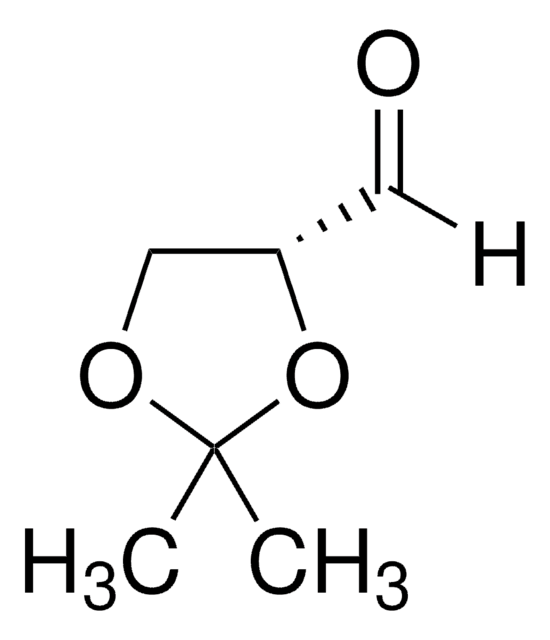Összes fotó(1)
Fontos dokumentumok
G4802
DL-Glyceraldehyde, dimer
95%
Szinonimák:
3,6-Dihydroxy-1,4-dioxane-2,5-dimethanol
Bejelentkezésa Szervezeti és Szerződéses árazás megtekintéséhez
Összes fotó(1)
About This Item
Tapasztalati képlet (Hill-képlet):
C6H12O6
CAS-szám:
Molekulatömeg:
180.16
MDL-szám:
UNSPSC kód:
12352100
PubChem Substance ID:
NACRES:
NA.22
Teszt:
95%
Javasolt termékek
Minőségi szint
Teszt
95%
mp
144-145 °C (lit.)
tárolási hőmérséklet
2-8°C
SMILES string
OC[C@H]1O[C@@H](O)[C@H](CO)O[C@@H]1O
InChI
1S/2C3H6O3/c2*4-1-3(6)2-5/h2*1,3,5-6H,2H2
Nemzetközi kémiai azonosító kulcs
NGNVWCSFFIVLAR-UHFFFAOYSA-N
Általános leírás
DL-Glyceraldehyde , dimer, a dimeric form of DL-glyceraldehyde is an organic compound that possesses a symmetrical p-dioxan crystalline structure with equatorially bonded hydroxy and hydroxymethyl groups. It reacts with a primary alkyl amine to form a Schiff base, during the synthesis of DL-alanine derivatives.
Alkalmazás
- Aldehyde Reductase Activity: The enzymatic properties of DL-Glyceraldehyde dimer were examined in the context of aldehyde reductases from Euonymus japonica leaves, providing insights into the reduction processes of aldose sugars, which are significant for understanding stress responses in plants (Negm, 1986).
- Enzymatic Reductase Functions: DL-Glyceraldehyde dimer was studied in the purification and characterization of human liver aldehyde reductases, focusing on its role in metabolic detoxification, crucial for pharmaceutical applications involving drug metabolism and toxicity (Petrash and Srivastava, 1982).
- Protozoan Metabolic Pathways: The enzymatic characterization of aldehyde reductase from Crithidia fasciculata, with DL-Glyceraldehyde dimer as a substrate, provided insights into the metabolic pathways of protozoans, important for developing treatments against parasitic infections (Kobayashi, 1982).
Tárolási osztály kódja
11 - Combustible Solids
WGK
WGK 3
Lobbanási pont (F)
Not applicable
Lobbanási pont (C)
Not applicable
Egyéni védőeszköz
Eyeshields, Gloves, type N95 (US)
Válasszon a legfrissebb verziók közül:
Már rendelkezik ezzel a termékkel?
Az Ön által nemrégiben megvásárolt termékekre vonatkozó dokumentumokat a Dokumentumtárban találja.
Az ügyfelek ezeket is megtekintették
Experimental and Theoretical Study of the Products from the Spontaneous Dimerization of DL-and D-Glyceraldehyde
Federico G, et al.
Journal of the Brazilian Chemical Society, 16, 467-476 (2005)
Non-enzymatic transformation of dl-glyceraldehyde, 1, 3-dihydroxyacetone, and pyruvaldehyde with primary amine to the same dl-alanine derivatives
Yande H, et al.
Tetrahedron Letters, 56, 4516-4519 (2015)
Chan Mee Lee et al.
Archives of pharmacal research, 38(6), 1090-1098 (2014-10-16)
Aldose reductase (AR) is a key enzyme in the polyol pathway that is strongly implicated in the pathogenesis of diabetic complications. AR inhibitors have been proposed as therapeutic agents for diabetic complications through suppression of sorbitol formation and accumulation. In
Jae Sue Choi et al.
Archives of pharmacal research, 37(10), 1354-1363 (2014-07-06)
To investigate the effect of C-glycosylation at different positions of luteolin, the structure-activity relationships of luteolin and a pair of isomeric C-glycosylated derivatives orientin and isoorientin, were evaluated. We investigated the effects of C-glycosylation on the antioxidant, anti-Alzheimer's disease (AD)
Md Nurul Islam et al.
Food and chemical toxicology : an international journal published for the British Industrial Biological Research Association, 69, 55-62 (2014-04-10)
Vicenin 2, isolated from a traditionally used medicinal plant Artemisia capillaris, is a 6,8-di-C-glucoside of apigenin which has been previously reported to possess a wide variety of pharmacological activities including antioxidant, anti-inflammatory, anti-cancer, and hepatoprotective. However, there have not been
Tudóscsoportunk valamennyi kutatási területen rendelkezik tapasztalattal, beleértve az élettudományt, az anyagtudományt, a kémiai szintézist, a kromatográfiát, az analitikát és még sok más területet.
Lépjen kapcsolatba a szaktanácsadással











